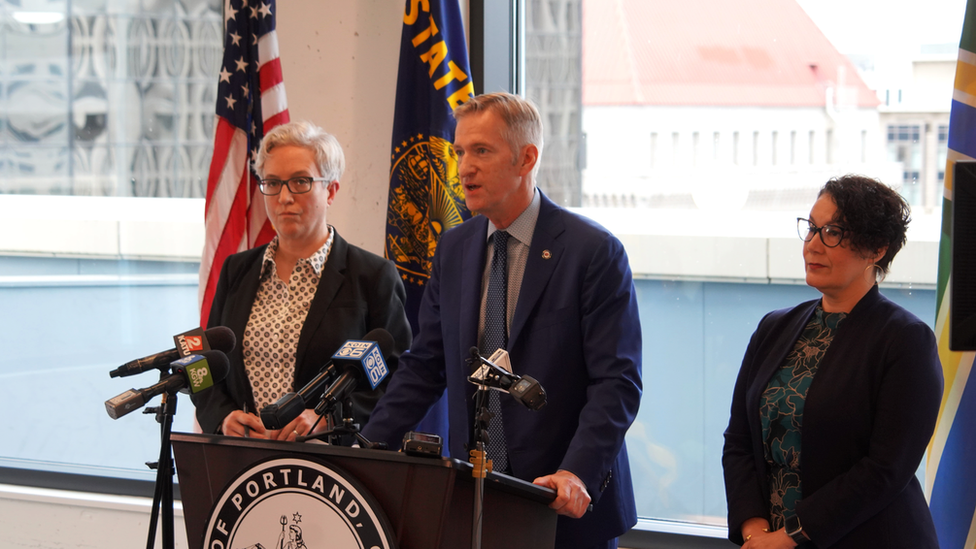Portland declares 90-day state of emergency to tackle fentanyl use
- Published

A 90-day state of emergency has been declared by officials in Portland as part of an effort to tackle the use of fentanyl in Oregon's largest city.
A synthetic painkiller 50 times more powerful than heroin, fentanyl has been blamed for a rise in US drug deaths.
In Oregon, the rise coincided with a move to decriminalise the use of most drugs, including fentanyl.
But on Tuesday, senior state and city officials said Portland was being damaged by open use of the drug.
The city has been struggling from homelessness and drug use in recent years, causing several major businesses and some residents to move out of the city.
According to Multnomah County - where Portland is located - the number of overdose deaths involving fentanyl increased by 533% between 2018 and 2022.
Governor Tina Kotek, announcing the state of emergency, conceded that the city was suffering "economic and reputational harm" from the ongoing fentanyl problem.
"Our country and our state have never seen a drug this deadly addictive, and all are grappling with how to respond," she said in a statement.
Accompanied by Portland Mayor Ted Wheeler and Multnomah County Chair Jessica Vega Pederson on Tuesday, Gov Kotek announced a new "tri-government" action to tackle the issue.
The order establishes a temporary "command centre... where state, county and city employees will convene to coordinate strategies and response efforts," the officials said in a joint statement.
The plan also calls for the state health department to launch an advertising campaign on billboards, public transit and online which will promote drug prevention and treatment.
It also calls for more peer outreach and resources for addicts, and for police to crackdown on open drug dealing.
Gov Kotek said the three leaders will act with "urgency and unity across our public health and community safety systems to make a dent in this crisis".
"The next 90 days will yield unprecedented collaboration and focused resources targeting fentanyl and provide a roadmap for next steps," she added.
In 2020, residents of Oregon passed Measure 110, which decriminalised most drug use. Under the law, police encountering fentanyl users are meant to refer addicts to treatment centres, however many ignore the referral.
Opioid deaths in the state jumped from 738 in 2021, the first year the law was in effect, to 956 in 2022, according to state data.
Ms Kotek has previously called on state lawmakers to pass legislation that criminalises public drug use, similar to "open container" alcohol laws in the US.
But moves to roll back the state's liberal drug laws could face opposition from addiction-treatment groups, who say re-criminalisation will drive people to take fentanyl in private, possibly increasing overdose rates.
Related topics
- Published22 December 2023